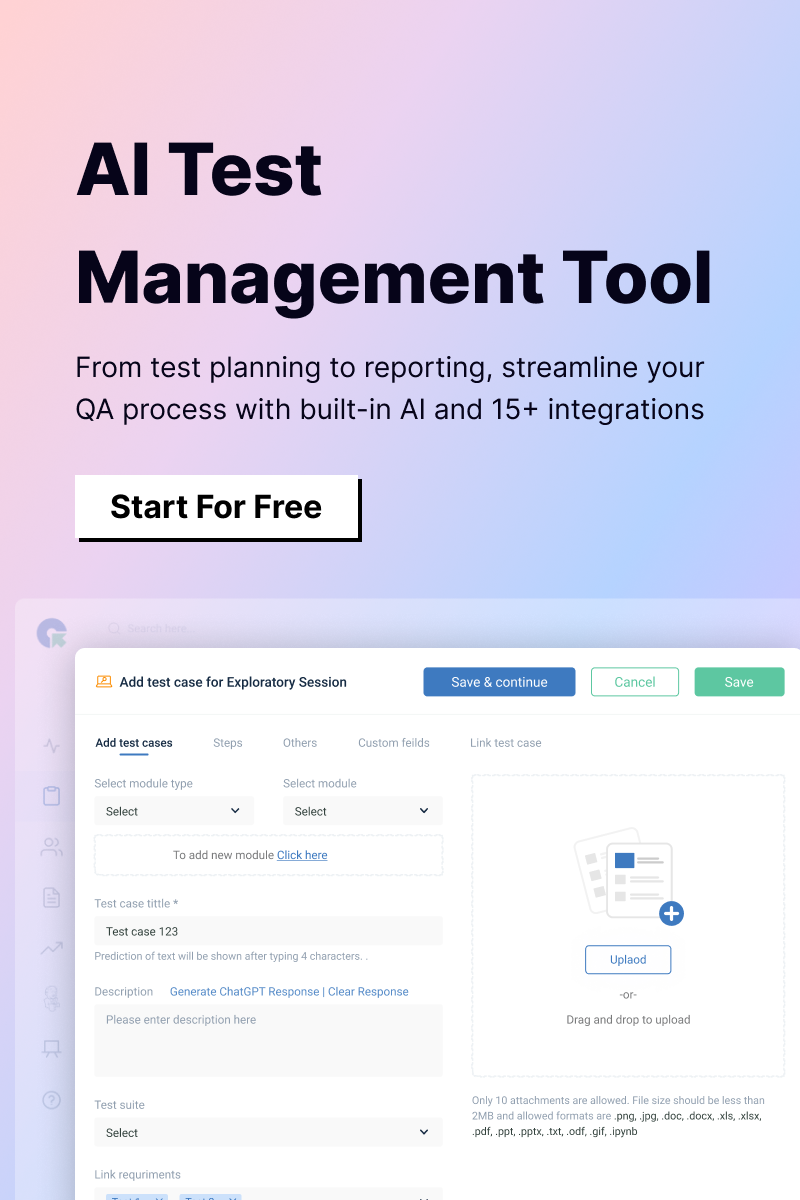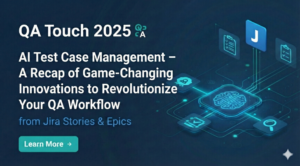AI in software testing has become a necessity rather than a luxury in the modern era. As software complexity reaches its peak and modern demands are challenging, it is inevitable to revamp the existing software testing tools with a new approach. This is where artificial intelligence comes into the picture in software testing. While traditional manual testing involves more time and resources, prone to errors, AI and underlying ML empower automation of testing workflows, such as test generation, execution, and analysis.
Traversing the software testing market will reveal that there is a surging demand for AI testing tools, and it is expected to continue in the coming years. These tools offer coherent features to users and hence propel market expansion. Organizations are shifting from conventional approaches to more flexible ones that facilitate auto-generated test scripts, autonomous testing, and intelligent predictive analysis. AI based test automation is expected to take the front seat and drive the testing process to high-quality, resilient, and efficient roadways.
This blog will cover the importance of artificial intelligence testing tools, selection tips, the best picked AI-powered testing tools, and best practices. Stay tuned to evolve yourself to make a sustainable fit in the challenging QA environment!
Why is AI Important in Software Testing?
Software testing constantly evolves with technical advancements, and today, AI integration has taken this move to the next level. To achieve the best outcomes, embracing AI’s potential and integrating it into regular workflows can become a crucial strategy. The following are some of the reasons that highlight the AI importance in software testing:
- Enhances test creation and optimization
Test creation and maintenance are one of the crucial workflows in software testing. AI eliminates the hassles of manual testing and some of the automation testing, and automates the test creation and optimizes it. AI algorithms analyse system requirements, code, and workflows to generate test cases, covering edge cases automatically. Some AI testing tools even generate test cases written in natural language. These tools even self-heal the test cases and make them more relevant after the changes in UI. The automation reduces manual efforts, speeds up the test creation, and improves the test coverage.
- Self-heals broken test scripts
One of the prominent reasons behind the adoption of AI in software testing is self-healing. Changes in UI or code are one of the common scenarios in software testing. AI in software testing addresses this common challenge and enables auto-adaption to changes in the application’s user interface or code. The AI integration reflects the changes in relevant test cases and prevents test failures due to minor UI changes. This highly reduces test maintenance and the need for manual intervention to address broken scripts. AI tools ensure test reliability even after frequent software updates.
- Analyzes large datasets for smarter testing
AI powered testing possesses the capability of analysing large datasets to identify patterns, anomalies, inconsistencies, and potential defects. Machine learning algorithms, NLP, and advanced data analytics processes these large datasets and can create test cases, automate repetitive tasks, and predict failures. Also, the AI-based tools analyse historical data and user behaviour to predict occurrences of defects.
- Reduces manual intervention and test maintenance
Automation always focuses on automating repetitive tasks and reducing manual intervention in the software testing process. Testers can concentrate on core and strategic tasks when their monotonous tasks are automated. Additionally, AI integration enables self-healing tests such that test cases can adapt themselves to changes in the application and optimize test execution. The predictive maintenance focuses on identifying areas where potential issues are most likely to occur.
- Supports faster releases and DevOps
To meet the demands of today’s fast-paced era, AI based testing tools integrate with CI/CD pipelines so that they can have faster release cycles. AI reduces the reliance on manual testing and speeds up the process through automation. They analyse the code, generate test cases, and lead to faster feedback loops to reach the market in minimal time.
How to Choose AI-Powered Testing Tools
The software market is flooded with so many AI testing tools, but there is a difference between having AI and actually being AI-powered. One should set a list of criteria to see whether the selected tool meets the requirements or not. The right tool amplifies the team’s efficiency and faster ROI. Here, we help you out with the basic criteria to choose the correct AI-powered testing tool:
- AI features
Go with the AI testing tool that exhibits all necessary AI features, like self-healing, predictive analysis, test generation, etc. All these AI-powered features make the software testing faster, efficient, and accurate. Self-healing helps to adapt the test scripts to changes in UI and reduces manual maintenance. Predictive analysis aids in analysing historical data and forecasting future outcomes. The AI-powered test generation analyzes application behaviour and generates test cases automatically. These are the must-have features, and one should go with other features based on the project/organization-specific requirements.
- Ease of adoption and onboarding
The tool should not force a longer and complex deployment process to get started with. AI based test automation tools require minimal or no coding expertise, and they can be easily adopted. Many tools require a low or medium learning curve and facilitate even non-technical team members to participate. Look for the tools with detailed documentation, community support, and integration guides so that onboarding becomes easy.
- Test coverage
Organizations work on diverse platforms to meet the industry demands. It is a common test case to check for cross-browser, cross-OS, and cross-platform testing. This ensures that the application works perfectly fine on all targeted platforms, and test cases cover the desired test coverage. Select one of the artificial intelligence testing tools that enables testing across various environments, like web, mobile, desktop, and API.
- Reporting and insights
Testing tools improve efficiency and boost the decision-making process by offering valuable insights. AI powered testing tools generate detailed, real-time reports that give quick insights. Look for a tool that will facilitate you with customized and AI-powered reports to identify trends, make confident decisions in real-time. Also, many tools provide dashboards that help to monitor test results and get clarity and control of the entire process.
Top AI-Powered Testing Tools Revolutionizing QA in 2025
AI-powered testing tools manage test coverage, planning, and real-time insights with the leverage of AI technology. Organizations can achieve the desired product quality by integrating top AI testing tools into the workflow. If you are also considering revolutionizing your QA in 2025, we have carefully selected a list of tools. Let’s have a glance:
1. LambdaTest
LambdaTest is an AI testing tool that empowers teams to test intelligently, test smarter, and ship faster. It offers a full-stack cloud with 10,000+ real devices and 3,000+ browser environments. LambdaTest comes with AI-native test management, MCP servers, and support for frameworks like Selenium, Appium, and Playwright.
Core Features:
- KaneAI: A GenAI-native test agent for generating, authoring using natural‑language commands.
- HyperExecute: High-performance orchestration engine with just‑in‑time environment provisioning, parallel execution, AI‑native optimization, and auto‑healing for robust CI/CD workflows.
- Test Insights: Unified analytics dashboard offering real‑time metrics, trend visualizations, flaky test detection, failure classification, and root-cause recommendations.
- Test Intelligence: Proactively catch issues and get AI insights to improve test quality, efficiency, and prevent future failures before they happen.
- Visual Regression Testing: Run UI comparison across devices and browsers with features like smart ignore zones, Figma/Storybook CLI support, and integrated CI reporting.
Pricing:
You can explore the freemium plan with limited features. For full access and advanced capabilities, reach out to their pricing page or sales team for more information about the premium plans.
Advantages:
- Reduced Infrastructure Overhead: Offload device/browser lab maintenance to a secure cloud platform.
- Accelerated Time-to-Market: Faster test execution and smarter orchestration speed up release cycles.
- Faster Feedback Loops: Real-time logs, alerts, and CI integrations help identify issues early in the dev cycle.
- Improved Test Reliability: Auto-heal, flaky test detection, and RCA reduce false failures and instability.
Enterprise-Grade Security: SOC2, ISO, and GDPR compliance ensures data privacy and regulatory alignment.
Use Cases:
Agentic software testing, AI testing, AI end-to-end testing, codeless automation testing, test management, test reporting, debugging, and more.
2. Testim
Tricentis Testim is a leading AI powered testing tool that tests faster, increases reliability, and facilitates end-to-end testing. It simplifies the UI test automation with the integration of machine learning algorithms.
Core Features:
- Frictionless integration with CI/CD tools for faster deployment and release cycles.
- Visual editors to record user flows and configure them.
- Highlighted screenshots and failure suggestions to rectify and diagnose failed tests.
- AI-powered smart locators for more stable and low-maintenance tests.
Pricing:
Users can try the free version with limited features. For a more feature-rich experience, contact the sales team for the premium version.
Advantages:
- Improved test coverage with the fast authoring feature.
- Reduced flakiness and resource saving with AI-powered stabilizers.
- Faster test creation and reduced maintenance with AI integration.
- Automatically adapt to minor test changes with self-healing.
Use Cases:
Mobile testing, low-code testing, cross-browser testing, reporting, Salesforce testing, functional testing, regression testing, etc.
3. Functionize
Functionize is a pioneer that integrates AI in software testing and revolutionizes enterprise automation with its top-notch features. It accelerates release cycles with seamless integrations with leading testing tools like Jira, GitHub, Jenkins, etc.
Core Features:
- Use of Natural Language Processing for test creation.
- AI integration enhances test automation and facilitates non-technical users to create tests in NL.
- Self-healing tests to adapt the changes in the tests automatically and update them.
- Cloud scalability supports large-scale testing.
Pricing:
Pricing is not publicly available. Contact the sales team for more details.
Advantages:
- Multimodal AI models enhance accuracy and improve automation efficiency.
- Less maintenance with self-healing tests.
- Simple description of tests in plain English.
- Accelerated product releases to meet market demands and rapid innovation.
Use Cases:
Smart fixes, API testing, file testing, functional testing, visual testing, and end-to-end testing.
4. Mabl
Mabl is a cloud-based test automation platform that enhances the efficiency and effectiveness of an organization’s software testing workflow. The unified platform enables teams to collaborate such that they can combine test types and share assets within the same plan.
Core Features:
- Generative AI to enhance test coverage and maintain efficiency,
- Use of ML for test optimization and faster execution.
- Seamless integrations with Jira, Postman, GitHub, Jenkins, MS Teams, etc.
- Auto-healing tests automatically detect changes in the UI and update the test accordingly.
- Dynamically adjust test execution depending on real-time application aspects.
Pricing:
Contact the sales team for pricing details.
Advantages:
- Early detection of unintended defects.
- Low-code testing enables team members to participate in testing regardless of their coding knowledge.
- Accelerated release cycles with flawless integrations.
- Intuitive user interface and AI-powered features facilitate ease of handling.
Use Cases:
AI Auto-healing, cross-browser testing, API testing, low-code testing, mobile app testing, performance testing, etc.
5. Applitools
Applitools focuses on visual UI testing and utilizes AI to compare screenshots and identify inconsistencies across various browsers, devices, and operating systems. The platform provides full end-to-end test automation, integrating AI at every step, to streamline the workflows.
Core Features:
- Excellent visual AI testing detects UI issues, visual inconsistencies, etc.
- Speed up the deployments.
- Easy-to-use recorder to create complex test cases without actually writing code.
- Seamless continuous test execution with CI/CD and GitHub Actions integrations.
Pricing:
A free trial is available. Four different subscription plans are available. Contact the sales team to know more.
Advantages:
- Compatible with diverse test environments.
- Run tests individually or in groups with a single click.
- Self-healing locators clean and maintain the test pipelines.
- Faster detection of visual bugs.
Use Cases:
Visual testing, functional testing, regression testing, cross-browser testing, and accessibility testing.
6. ACCELQ
ACCELQ is one of the leading artificial intelligence testing tools that enables test creation, maintenance, and execution with the leverage of AI autonomously. This cloud-based platform facilitates web, mobile, API, desktop, and backend testing to meet all your testing needs.
Core Features:
- Test step generator for comprehensive and end-to-end test flows.
- No-code action logic builder is good for technical and non-technical team members.
- Automatic test case creation from business process scenarios with a test case generator.
- AI designer transforms recorded or customized tests into reusable tests.
Pricing:
Free version available.
Advantages:
- Improve the stability and reliability of tests as the tool automatically adapts.
- Dual-panel view to build test logic and get a live preview of the app under the test.
- Seamless automation of functional tests.
- Seamless integration with CI/CD.
Use cases:
Cross-browser testing, system testing, dynamic test suites, shift-left testing, and database testing.
7. Virtuoso
Virtuoso is a popular testing tool that integrates AI in software testing to make it more feature-rich and efficient. The self-healing tests boost the accuracy and speed of the testing process. The unified platform optimizes test execution and analysis, enables test monitoring, and improves testing processes.
Core Features:
- Ability to write test cases in plain English. Get the context-aware suggestions to bridge the gap between intentions and executions.
- Autonomous waits enable faster test creation and more stable executions.
- Test execution on any device, browser, OS, and environment.
- Get detailed insights and have a root cause analysis of defects.
Pricing:
Pricing is not publicly available.
Advantages:
- Simplified syntax for complex commands promotes a low learning curve.
- Detects and fixes typos in real-time, reducing failure rates.
- Facilitates deep test reporting and performance metrics.
Use cases:
AI-powered test automation, agentic AI software testing, CI/CD integration, functional UI testing, end-to-end testing, codeless testing.
8. Katalon (with AI enhancements)
Katalon is a modern AI based test automation tool that empowers QA teams to manage, launch, and optimize testing workflows on web, mobile, and API platforms. The intuitive user interface helps technical and non-technical users operate the tool effortlessly. AI-powered test creation, execution, management, and maintenance make the test management reliable and efficient.
Core Features:
- Seamless integration with CI/CD tools for faster deployment and reliable releases.
- AI-powered scriptless automation testing
- Dynamic test suites to organize designed tests with TestOps.
- Self-healing tests to locate broken locators and suggest fixes.
Pricing:
Free trial version available. Premium version starts at $183/month/user. For enterprise pricing, you need to contact the sales team.
Advantages:
- Low-code testing to facilitate non-technical users to participate in the testing process.
- Extensive integrations with tools like Jira, Jenkins, Google Cloud, and GitHub to fit into your particular quality.
- Enhanced test management with hassle-free automation.
- Excellent reporting features, including release readiness, requirement coverage, etc.
Use Cases:
Regression testing, visual testing, bug tracking, reporting, API testing, Source code management, performance testing, model-based testing, and test data management.
9. Appvance IQ
Appvance IQ is one of the AI based test automation tools that redefine software quality by addressing today’s enterprise needs. The tool helps in efficient test management with AI integration and speeds up the process. It ensures maximum application coverage with AI-generated test scripts.
Core Features:
- Simple and accelerated testing with AI script generation.
- Self-healing and resilient test scripts for diverse platforms.
- Single dashboards to enable access to reports for everyone.
- Find all possible user flows in the application with autonomous AI.
Pricing:
Pricing details not available.
Advantages:
- Improve user experience with the power of AI testing tools.
- Unlimited AI test instances to fit growing testing needs.
- Faster and data-driven test execution for better accuracy.
- Low or almost no test case maintenance.
- Enhanced bug detection.
Use cases:
Bug detection, regression testing, functional testing, security testing, load and performance testing.
10. TestSigma
TestSigma is one of the cloud-based artificial intelligence testing tools that automates end-to-end testing for various platforms, including web, mobile, APIs, and ERP systems. With the tool, organizations can drive speed, scale, and quality across the entire STLC- right from planning, development, to execution, reporting, and analytics.
Core Features:
- Accelerated self-healing automated test development in simple English/NLP.
- Collaborate with teams for efficient test management with collaboration and review features.
- Seamlessly fit into workflows by integrating with favourite tools like Jira, GitHub, Jenkins, etc.
- Scale testing coverage with low-code data-driven testing.
- Effortless test data generation and test reporting.
Pricing:
Trial version available. Contact the sales team for the premium version.
Advantages:
- Achieve maximum test coverage with AI-based cross-browser testing.
- Execute tests on over 3,000 device OS combinations through cross-device testing.
- Reduced feedback and test execution time with parallel execution.
- Unified platform to address all testing needs.
Use Cases:
Regression testing, continuous testing, functional testing, sanity testing, end-to-end testing, integration testing, and system testing.
Best Practices for Using AI Testing Tools
AI in software testing can streamline workflows by automating tasks, simulating real-life scenarios, and excelling in predictive analysis. QA teams can follow the following practices to optimize the results:
- Combine AI with human oversight
Software testing is a collaborative process that integrates human and artificial intelligence to generate desired testing outcomes. No single process, whether human or AI, can alone achieve the same results. Therefore, it is a good practice to combine AI with human oversight to achieve the best of both worlds. AI can automate repetitive processes, while humans excel in tasks such as decision-making and predictive analysis. Combining both can ensure decisions align with ethical standards and broader societal values.
- Start with regression and repetitive test cases
Regression testing ensures no new errors are introduced after the integration, and old errors are also rectified. AI testing tools like QA Touch excel in regression testing by providing maximum test coverage, faster testing cycles, and identifying potential issues more quickly. The self-healing feature of AI testing tools can adapt test data and generate new test cases automatically.
- Monitor test stability over time
Regularly monitoring test stability is one of the best practices experts advise. This helps to make the test cases relevant and apt over time, maintaining consistency. AI in software testing tools helps to adapt the test cases accordingly and make them robust over time. These tools can integrate with CI/CD pipelines so that the team can visualize test performance, identify trends, and surface common errors.
- Use visual dashboards to interpret AI insights
AI-powered testing tools feature visual dashboards that integrate the strengths of AI and data visualization. This helps to provide a more insightful, user-friendly interpretation of insights. The tools leverage machine learning and other AI techniques to go beyond static reporting and offer real-time updates, predictive analysis, and anomaly detection.
- Continuously feed feedback into AI models
AI testing tools are based on the input data, and results are generated based on this input and in-built algorithms. Factors like accuracy of the outcomes, improvement, and effectiveness highly depend on the feedback you feed into the AI models. Feeding regular feedback into the AI models facilitates the following benefits:
- Maintain relevance.
- Learn from mistakes.
- Continuous improvement.
- Enhanced decision-making.
- Improved accuracy and efficiency.
Conclusion
There is no doubt that AI testing tools will rule the future of software testing, and their adoption in daily workflows is inevitable. Emerging technologies like machine learning, artificial intelligence, and NLP significantly reduce manual intervention, save resources, bring efficiency, and help make better decisions. With the automation at its peak and AI-powered predictive features, AI in software testing really transforms the process to make it effortless. Features like self-healing, AI-powered test generation, and insightful reporting and analytics not only boost accuracy, speed, and coverage but also make the testing process more stable, relevant, and reliable.
The demand for AI testing tools is surging as new features and the complexity of software applications both take new highs day by day. So, it is ought upon modern organizations to bring new alternatives for their existing tools and transform the cubicle picture. They need to keep themselves ready for new-era challenges like faster release cycles, lower maintenance, auto-generated test cases, improved accuracy, etc. AI based test automation tools can make them sustainable in this challenging future.










